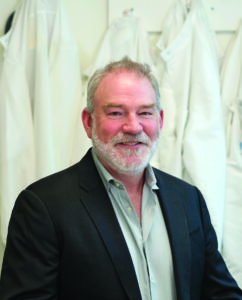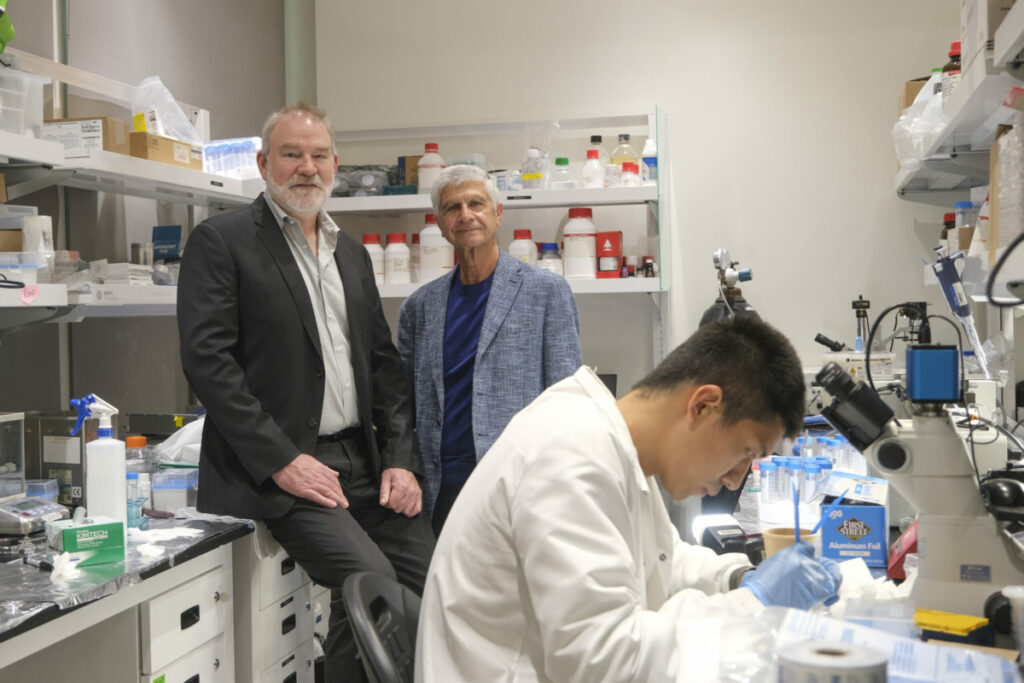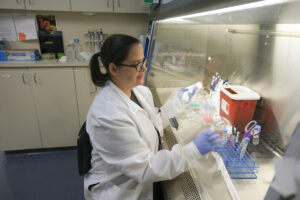Westwood-based cancer immunotherapy company Nammi Therapeutics Inc., which is one of many startups racing to develop immune response treatments for cancer, has received a pair of recent awards that it hopes will enable it to stand out as it prepares to file a new drug application.

The first is a $4 million grant award from South San Francisco-based California Institute of Regenerative Medicine, also known as the California Stem Cell Agency. The grant, which was approved on Dec. 15 but has yet to be announced publicly, will help cover the final stage of preclinical trial costs.
The second award was announced last month jointly by Thousand Oaks-based Amgen Inc. and Torrance-based incubator BioLabs LA at the Lundquist Institute. This award, dubbed the “Amgen Golden Ticket,” gives Nammi one year’s free rent at BioLabs as well connections to Amgen’s scientific and business leaders.
“While both awards have material benefits, the bigger impact is that they validate the technology we’ve been developing,” said David Stover, Nammi’s chief executive.
That technology targets immunotherapy to the specific cancer tumor site, as opposed to boosting the overall body’s immune response. The goal is to deliver the highest possible immunotherapy dose with the least amount of harmful side effects.
The technology would first be aimed at cancerous tumors whose locations are too difficult for conventional surgical removal, such as certain brain tumors. Ultimately, Stover said, the immunotherapy could replace surgery altogether, but that is still years – if not decades – off.
Parallel tracks
Nammi’s technology grew out of a two-track development process. The first dates back to the company’s founding in 2018. Stover, a cancer therapy developer who had spent several years at Santa Monica biologics company Agensys helping to develop a monoclonal antibody treatment for cancer, had recently found himself out of a job as Agensys’s parent, Tokyo-based Astellas Pharma Inc. shut down Agensys in 2017 to focus on other more promising approaches.
Stover moved over to UCLA’s technology development group, where he met fellow researcher Andre Nel, who was working on a nanoparticle platform to convey immunotherapy drugs directly to a cancer tumor site. The pair recruited longtime Agensys Chief Executive Donald Rice to join them in a new venture to try to commercialize this technology. This new company, Nammi Therapeutics, was based at the California Nanosystems Institute’s incubator Magnify on the UCLA campus.
But the effort to come up with a drug platform ran into some difficulties, according to Stover.
“We found that the original technology that came over from UCLA didn’t work as advertised,” he said. “It took us a year to figure that out and then another year to develop a fix.”

As the trio and their team at Nammi were plodding along with this approach, Stover said he was keeping in contact with another team at the Magnify incubator called Qwixel Therapeutics. That company was working on immunocytokines, which combines antibodies with proteins that stimulate immune responses. These immunocytokines are then used to convey immunotherapy drugs to the tumor site.
Stover became Qwixel’s chief scientific officer, joining UCLA Professor Sherie Morrison, who was serving as president, and veteran biotech exec George Ayoub, who was serving as chief executive.
By the end of 2020, Stover said it had become apparent that Qwixel’s technology platform to deliver immunotherapy drugs was going to be ready for clinical trials before Nammi’s technology. In the first quarter of 2021, the decision was made to merge Qwixel into Nammi, which had a funding advantage with the completion in 2019 of $10 million in series A financing. Qwixel’s drug platform immediately became Nammi’s lead drug candidate, while the drug candidates that Nammi has been working on all along are still being fine-tuned.
Crowded market
But Nammi Therapeutics now finds itself in a crowded immunotherapy market.
“The immunotherapy space has exploded in last five to seven years,” said Stephanie Hsieh, chief executive of Biocom L.A., the local chapter of San Diego-based trade advocacy organization Biocom. “New innovations and therapies are constantly being created as people figure out how to make these therapies more targeted for different cancers. And you’ve also got billions of dollars in venture capital and other funding pouring into this area.”
Hsieh estimated there are several hundred – perhaps more than 1,000 – immunotherapy companies nationwide.
“I like to think about it as ice cream, with each company having its own particular flavor,” she added. “The holy grail is the precise targeting of immunotherapy drugs to treat cancers with absolutely minimal side effects.”
Often in such an environment, a handful of technologies win out over time, pushing out all the other alternatives.
But Hsieh said there are so many different types of cancer, and cancers often mutate over time. So there may be room for many of these technologies.
“Where the winnowing may occur is when the money begins to run out,” she said.

And that could happen sooner rather than later, she added, thanks to rising interest rates and macroeconomic uncertainty. There’s also uncertainty over the future regulatory framework for drug approvals and drug pricing.
The key, Hsieh said, is how effectively one immunotherapy company can distinguish itself from its hundreds of rivals. And she indicated that Nammi Therapeutics, which she has followed since its inception, may have a bit of an advantage.
“David (Stover) has the track record and is great at spotting new approaches and how to apply them,” she said.
New digs
In the short run, however, Nammi has a lot of activity going on as it nears its target date of late this year for submission of its new drug application to the Food and Drug Administration. (The drug platform being put forward is the one initially developed by Qwixel.)
The company is in the midst of a series B fundraise, with proceeds applied to finishing preclinical trials and then preparing for the full-blown clinical trials. That’s in addition to the $4 million grant from the California Institute of Regenerative Medicine.
And Nammi is in the middle of moving to new incubator space. For the last five years, it’s been housed at the Magnify incubator on the UCLA campus. But now it’s relocating to a brand-new incubator run by Westwood-based Terasaki Institute for Biomedical Innovation in L.A.’s Sawtelle neighborhood; Nammi is set to be the first tenant to fully move into the incubator.
Also, thanks to the award from Amgen/BioLabs L.A., Nammi will now get a year’s free rent at BioLabs, where it has until now been paying to use the full range of lab amenities not available at UCLA’s Magnify incubator. Nammi is the third company to win the award; the first two were Torrance-based Karma Biotechnologies and Diadem Therapeutics, which is still headquartered at BioLabs.
“After witnessing the success of the first two award recipients (Karma Biotechnologies and Diadem Therapeutics), we cannot wait to see what progress this collaboration with Nammi Therapeutics drives next,” Lindsay Bourgeois, site director at BioLabs L.A., said in the award announcement.
